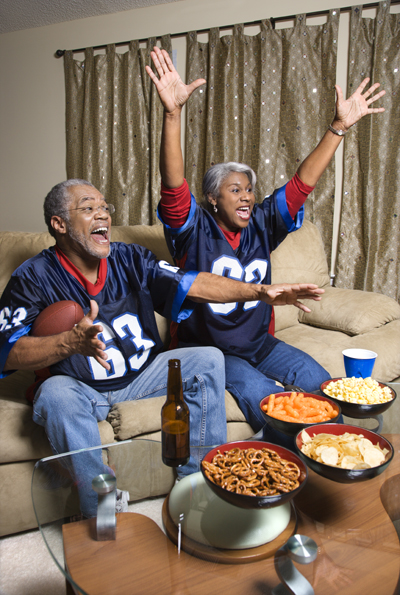Five Health Tips for Your Super Bowl LII Party
January 29, 2018

On February 4, people across America will be gathering at Super Bowl parties to watch the battle of the Patriots and Eagles, the halftime extravaganza, and of course, those commercials. If you’re going to a party or hosting one at your house, here are five tips that will let you be a health winner, no matter how your team does.
- Don’t let the flu score any points. February is often peak flu season, and gatherings of any kind during this time of year can help spread the virus. Did you know that flu cases increase in towns whose teams are participating in the big game? Researchers from the Tulane University School of Public Health noted, “Having a team in the Super Bowl resulted in an average 18 percent increase in flu deaths among those over 65 years old, a population more vulnerable to serious complications from influenza.” Flu season 2018 is shaping up to be especially dangerous for seniors, so be sure to get your flu shot, wash your hands often, and stay away from people who are sick.
- Practice food safety. Experts in foodborne illness report that Super Bowl Sunday ranks close behind Thanksgiving as a time when hosts may be lax about safe food handling. If you’re laying out a spread for your guests to enjoy, be sure to keep perishable foods at a safe temperature and don’t let those goodies sit out all day. Chips and pretzels can be kept at room temperature, but other traditional Super Bowl foods such as chicken wings, pizza and chip dips should be kept hotter than 140° or colder than 40° until serving, and shouldn’t sit out longer than two hours. Food safety experts also warn us that “double dipping”—scooping up dip with a chip, taking a bite, then using the same chip again—can spread germs. Provide individual serving plates rather than a communal bowl.
- Don’t overdo the alcohol. Super Bowl parties traditionally feature lots of beer and specialty cocktails. But don’t celebrate your team’s win—or drown your sorrows if they lose—by imbibing an unhealthy amount. You’ll be sorry the next day. And if you will be driving home, consider sticking to Gatorade! The Auto Club of California and the California Department of Insurance recently reported that there is a 77 percent increased risk of alcohol-related crashes on Super Bowl Sunday! Said Auto Club’s Chief Executive Officer Robert Bouttier, “We encourage everyone to make a plan—designate a sober driver ahead of time, contact a ride-sharing service or use a taxi or public transportation.”
- Be mindful of your stress level. Cardiologists say that watching an exciting sporting event can drive our heart rate up, up, up! The athletes on the field have trained for this event, but people watching from the bleachers or on their couch at home could be at higher risk of a heart attack or stroke, especially if they already have risk factors such as hypertension or obesity. What part of the game is the most suspenseful? A research team from the Montreal Heart Institute noted, “While it would be easy to assume that the most heart-pounding moments of a game come right at the end,” in fact, it’s the dramatic moments, the “high-stakes or high-intensity portions of the game,” that can really get our hearts pounding.
- Put out a healthier spread. It’s OK to splurge on some unhealthy treats sometimes, but why not use this occasion to set a good example for your guests? Instead of fried tortilla chips with fatty queso dip, serve baked chips with salsa or vegetarian refried beans. And don’t worry about that guacamole—avocadoes contain a generous helping of the healthy kind of fats. Season and bake those chicken wings rather than deep frying. Serve fresh-cut veggies and a yogurt-based dressing. Make vegetarian chili, or use ground turkey. Ordering pizza? Choose a thin-crust style with lots of veggies and skip the fatty, processed meats.
Source: IlluminAge AgeWise
Categories: Uncategorized
![Health Concepts [logo]](https://healthconceptsltd.com/wp-content/themes/healthconcepts-corporate/images/logo.png)
